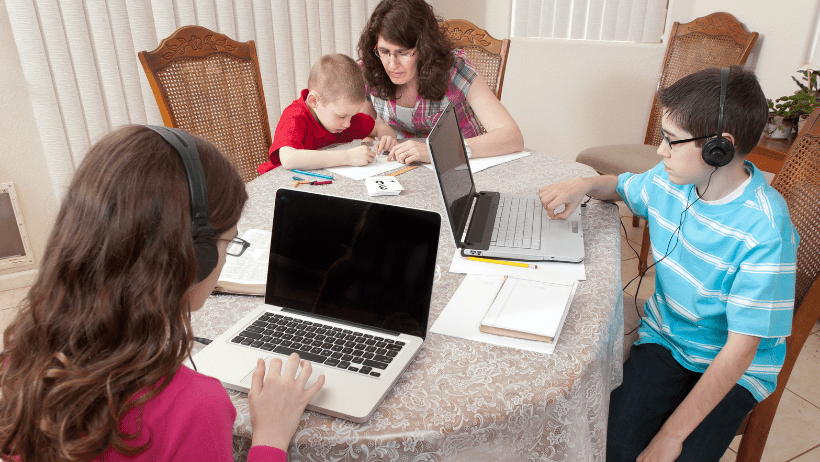Homeschooling in 2022: What is it and Can I Do It?
Since the pandemic, homeschooling has been given a closer look as a viable option to educating our children. This article looks at the current landscape of what is available to parents who are exploring homeschooling and what home learning looks like in this brave new world.
At first glance, it may seem that with so many schools having been closed for safety reasons, there would be an increase in demand for homeschooling or virtual schooling. But first, what is homeschooling?

What is homeschooling?
In my opinion, homeschooling is parent-directed education. It can take many forms – from following a set curriculum at home, part-time micro-schools, co-ops, distance learning, nature-based, literature-based, unit studies, be secular or non-secular, unschooling, or an eclectic mix of all or any of the above.
Homeschooling can be done alone or with a group of families, and many ways to learn. Homeschoolers benefit from being able to blend learning styles – even if they are all in one family!
But first, what does the law say about homeschooling?
The legality of Homeschooling in the United States is based on each state’s laws. All fifty states currently allow homeschooling, but each has its own regulation and requirements. So, if you are interested in homeschooling, check your state laws!
Now let’s look at what is available to parents who want to explore homeschooling…
For Parents Who Want To Explore Homeschooling:
There are many online resources and curriculums that can be found with just a quick internet search. The Home School Legal Defense Association (HSLDA) website is a great resource for finding information about your state’s requirements.
To find out what is happening locally, turn to social media groups like Facebook or a resource like The Homeschool Mom to find out who is around you. Rediscover your local parks, museums, and library.
Can I do this?
There are many ways and reasons to start homeschooling. Sometimes the decision is natural, sometimes difficult, sometimes accidental. But now you are standing on the doorstep of your family’s homeschool journey; you wonder if you can do it.
You don’t need to be certified.
A lot of people ask, “Don’t you need to be a certified teacher?”
Well, that helps give you a starting point for organizing your lessons and knowing about classroom management, but it isn’t a requirement.
You are the best expert on your own kids. You’ve raised them from their beginnings and already have been their first teacher. You were there helping them learn to walk, dress, and know what is acceptable in your household. To be an effective homeschooling parent, you need to have a desire to help your kids learn and the ability to find the resources to do it.
“What about subjects that I don’t know very well?”
We are fortunate to live in a world that is rich with information and the ability to access it. If you can look information up on the Internet and/or library, there are tools out there to help you.
Also, homeschooling can be a misnomer. It implies that schooling is just done in the home. While that can be the experience for some homeschoolers, it isn’t the reality for most. Homeschool families reach out to whatever resources are available to learn their objectives. Whether that is attending a subject-specific class, participating in enrichment/academic co-operatives, visiting learning sites like museums and businesses, hanging out in nature, to hiring a tutor.
Some days, I feel I ‘car-school,’ as a lot of learning is happening on the road through audiobooks, lessons done in between driving to various classes, or just discussions in the car as we are out doing family business.
When I don’t know an answer, we look it up. When I don’t know to teach a specific subject, I get help. Am I a certified teacher? No. Just an involved parent.
Can you afford to have a parent at home?
This is a discussion that many families have, which is akin to having any parent stay at home regardless of whether you are going to homeschool or not. You need to look at your expenses to see if your family can survive on one paycheck.
In looking at all the numbers, list out all your fixed costs. Those are the expenses that happen regularly no matter what, like your rent/mortgage, car payments, utilities, groceries, insurance, contributions to college/savings/retirement accounts, etc. Next, list your variable expenses, like how much you spend on restaurants, childcare, clothes, seeing movies, gifts, magazine subscriptions, TV subscriptions, etc.
Track your expenses for a couple of months and see where your money is going.
See what habits pop up that you wouldn’t have if you stayed at home. Like would you be feeding a daily coffee habit at $4/cup at the local java shop on the way to work? Would your dry cleaning bill go down because you wouldn’t need to take your work clothes in? Would you eat out less because you’d be home to make more meals in? Would your transportation costs go down as you are not paying for daily commutes?
Though this is related to staying home in general with a new baby, this online calculator from Parents.com can help you look at your expenses.
http://www.parents.com/pregnancy/considering-baby/financing-family/calculator/
Now there are intangible benefits for staying-at-home to homeschool your kids. For me, it is knowing what they are experiencing and learning and sharing it with them.
I don’t get one-line answers of ‘nothing’ when I asked what they did at school that day. I know because I was there.
It’s also because time is the one thing I can’t get back to, so I am glad that I can see more of my kids develop and grow. In the process, I’m growing and learning with them.
Homeschooling and working
Sometimes family situations don’t allow a parent to stay home, or you’re a single parent, but you still want to homeschool your kids. Depending on what arrangements are needed for your kids’ care while you are working, it is still possible.
The beauty of homeschooling is the flexibility of when and how you learn. Learning doesn’t have to only happen during the hours of 8 am to 2:30 pm. Many homeschoolers find that they complete a day’s school work in a fraction of the time of a traditional school day.
So what’s keeping you from flipping the lesson time to the evenings? Or have your work time be on the weekends?
Telecommuting/work from home families has made homeschooling work for them. They teach in between meetings/calls. This has become a current reality for many parents since the pandemic, where most public school children were shifted to online/distance learning.
Take work breaks checking in on the kids’ lesson progress. In my case, I freelance and work my projects around my kids’ activities. A lot of productive work is done during nap time and while my kids take classes.
This may be nowhere near your situation, but just examples of how I have seen it done and am currently doing it myself.

Technology and Homeschooling
One of the best things about homeschooling is using technology to supplement your child’s education. There are so many great resources available online and through apps.
If you’re feeling overwhelmed by all the choices, start with one subject or grade level and find some good resources before branching out to other topics.
Some of our favorite resources include:
– YouTube for Homeschooling (lots of channels with educational content)
– Khan Academy (free online tutoring for math and other subjects)
– Discovery Education streaming (educational videos on lots of different topics)
– ABCMouse.com (online learning program for preschoolers – my kids love this!)
There are also many podcasts that are Educational and Homeschooling related. A quick Google search will bring up plenty of resources to get you started.
In Summary
There are a lot of misconceptions about homeschooling, and it can be hard to know where to start if you’re considering it as an option for your family. The first step is to do some research and see the requirements in your state.
After that, take time to listen and learn with your kids. Each kid has their own learning style. If you are unsure what it is, take our free assessment here.
Homeschooling can look different for every family, so don’t feel like you must fit into a specific mold. There are many resources available to help you get started.
Lastly, don’t be afraid to ask for help. Many online groups and communities of homeschoolers are more than happy to offer advice and support.



